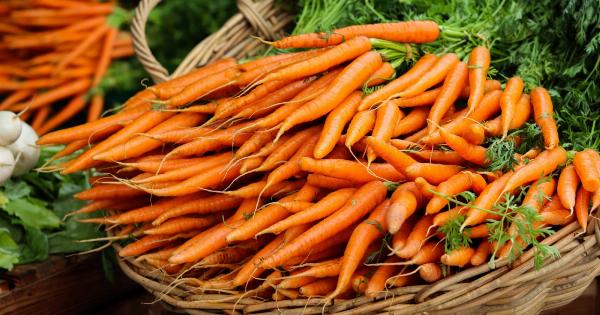There’s more to pumpkins and other orange vegetables than just carving them up for Halloween or serving them up as pie during Thanksgiving.
These brightly colored vegetables are packed with nutrients that play a crucial role in keeping our immune system strong and reducing inflammation in the body.
What Makes Orange Vegetables So Nutritious?
Orange vegetables like pumpkin, sweet potato, carrots, and butternut squash are rich in a variety of vitamins and minerals that are essential for good health. Here are some of the key nutrients found in these vegetables:.
Carotenoids
One of the primary reasons why orange vegetables are so good for you is their high levels of carotenoids.
These are natural pigments that give these vegetables their vibrant color, and they’re loaded with antioxidants that protect against various diseases. Some examples of carotenoids found in orange veggies include beta-carotene, alpha-carotene, lutein, and zeaxanthin.
Vitamin A
Many orange vegetables are also rich in vitamin A, which is important for maintaining healthy skin and eyesight.
Vitamin A also plays a critical role in the proper functioning of the immune system, helping to keep it strong and resilient against infections and diseases.
Vitamin C
Vitamin C is another critical nutrient found in many orange vegetables. This vitamin is a powerful antioxidant that helps to protect cells against damage caused by free radicals.
It’s also essential for collagen production, which is important for maintaining healthy skin, bones, and joints.
Potassium
Potassium is essential for regulating blood pressure and maintaining proper fluid balance in the body.
Orange vegetables like sweet potatoes and butternut squash are particularly high in potassium, making them an excellent choice for promoting heart health and overall wellness.
Fiber
Fiber is an important nutrient found in many orange vegetables, and it plays a crucial role in supporting healthy digestion and preventing chronic disease.
A diet rich in fiber has been linked to a lower risk of heart disease, diabetes, and certain types of cancer.
How Orange Vegetables Boost Immunity
One of the primary benefits of eating orange vegetables is their ability to boost the immune system. Here’s a closer look at how some of the key nutrients found in these vegetables support immune function:.
Beta-Carotene
Beta-carotene is a powerful antioxidant that has been shown to stimulate immune function by increasing the production of white blood cells. These cells are essential for fighting off foreign invaders like bacteria and viruses that can make you sick.
Some studies have also found that beta-carotene may help to reduce inflammation in the body, which can help to prevent chronic diseases like heart disease and cancer.
Vitamin A
Vitamin A plays a crucial role in supporting immune function, as it helps to regulate the growth and differentiation of immune cells.
When you don’t get enough vitamin A, your immune system can become weakened, making you more susceptible to infections and diseases.
Vitamin C
Vitamin C is essential for the proper functioning of the immune system, as it helps to stimulate the production of white blood cells that defend against infection.
This vitamin is also a powerful antioxidant that can help to protect cells against damage caused by free radicals.
Other Immune-Boosting Nutrients Found in Orange Vegetables
Many orange vegetables are also rich in other nutrients that support immune function, including zinc, copper, and selenium.
These minerals help to build and maintain a strong immune system, ensuring that you stay healthy and protected against infections and diseases.
How Orange Vegetables Fight Inflammation
Inflammation is a natural response to injury or infection, but when it becomes chronic, it can contribute to the development of various diseases like heart disease, diabetes, and cancer.
Fortunately, orange vegetables are packed with nutrients that can help to reduce inflammation in the body.
Carotenoids
The carotenoids found in orange vegetables are powerful antioxidants that can help to reduce inflammation in the body.
Some studies have even found that consuming foods high in carotenoids can help to reduce levels of C-reactive protein (CRP), a marker of inflammation and a risk factor for heart disease.
Vitamin C
Vitamin C is another nutrient found in orange vegetables that can help to reduce inflammation.
This vitamin has been shown to lower levels of pro-inflammatory cytokines in the body, which are responsible for triggering inflammation and contributing to chronic disease development.
Potassium
Research has shown that a diet rich in potassium can help to reduce levels of inflammation in the body.
Orange vegetables like sweet potatoes and butternut squash are particularly high in potassium, making them an excellent choice for fighting inflammation and promoting overall health.
Tips for Incorporating More Orange Vegetables Into Your Diet
If you want to reap the health benefits of orange vegetables, here are some easy ways to incorporate them into your diet:.
- Add roasted pumpkin or sweet potato to your morning omelet or breakfast hash
- Make a hearty vegetable soup with carrots, pumpkin, and butternut squash
- Roast carrots, sweet potatoes, and Brussels sprouts for a quick and easy side dish
- Grill up some sliced sweet potato or zucchini for a tasty and nutritious snack
- Bake a butternut squash casserole for a comforting and healthy dinner
- Whip up a batch of homemade carrot or pumpkin soup for a warming and nourishing meal
Conclusion
If you’re looking for an easy and delicious way to boost your immunity and fight inflammation, be sure to add more orange vegetables to your diet.
These veggies are loaded with nutrients that support good health, and they’re incredibly versatile and easy to incorporate into your meals. So go ahead and enjoy that bowl of pumpkin soup or roasted sweet potatoes – your body (and taste buds) will thank you!.





























